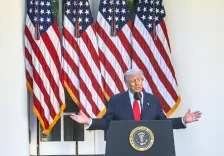Has Australia's Conservative Opposition Split After Historic Election Defeat?

Synopsis
Key Takeaways
- The Coalition has fractured for the first time since 1987.
- David Littleproud emphasizes a focus on future policies.
- Labor Party achieved a historic landslide victory.
- Negotiations on key policies failed between the two parties.
- Coalition's seat count in parliament has significantly decreased.
Canberra, May 20 (NationPress) The conservative Coalition in Australia has fractured as the National Party declared it would not re-establish its alliance with the Liberal Party following a significant loss in the federal election.
On Tuesday, David Littleproud, leader of the Nationals, stated that the party has opted not to forge a new Coalition agreement for the 48th parliament after negotiations with the new Liberal leader, Sussan Ley, fell through.
This decision follows the May 3 elections for the 48th parliament, during which the governing centre-left Labor Party was re-elected in a remarkable landslide victory.
"The National Party will operate independently on a fundamental basis," Littleproud told the media in Canberra.
"Our focus is on moving forward, avoiding the past, and striving to reclaim vital policy elements that impact the lives of the constituents we serve."
This marks the first split of the Coalition since 1987. After reuniting post the 1987 election, the Coalition governed Australia from 1996 to 2007 and again from 2013 to 2022, with the urban-centric Liberal Party as the senior partner and the rural-oriented National Party as the junior.
The terms of their agreement have been revised after each general election but have consistently remained confidential.
Littleproud mentioned that he and Ley, elected as Liberal leader on May 13, were unable to reach consensus on policy matters, including nuclear power and divestiture powers for major supermarket chains.
Nevertheless, he expressed his commitment to collaborate with Ley "daily" to mend the relationship, aiming to re-establish a Coalition agreement before the upcoming general election.
The Australian Electoral Commission reported that as of Tuesday, Liberal and National candidates were ahead in the vote count for 42 of the 150 seats in the lower house of the 48th parliament, a downturn from the 58 seats the Coalition secured in the 2022 election, as reported by Xinhua news agency.
Labor candidates were leading in 94 seats, according to the AEC, which would mark the highest number of seats won by any party in Australian electoral history.









